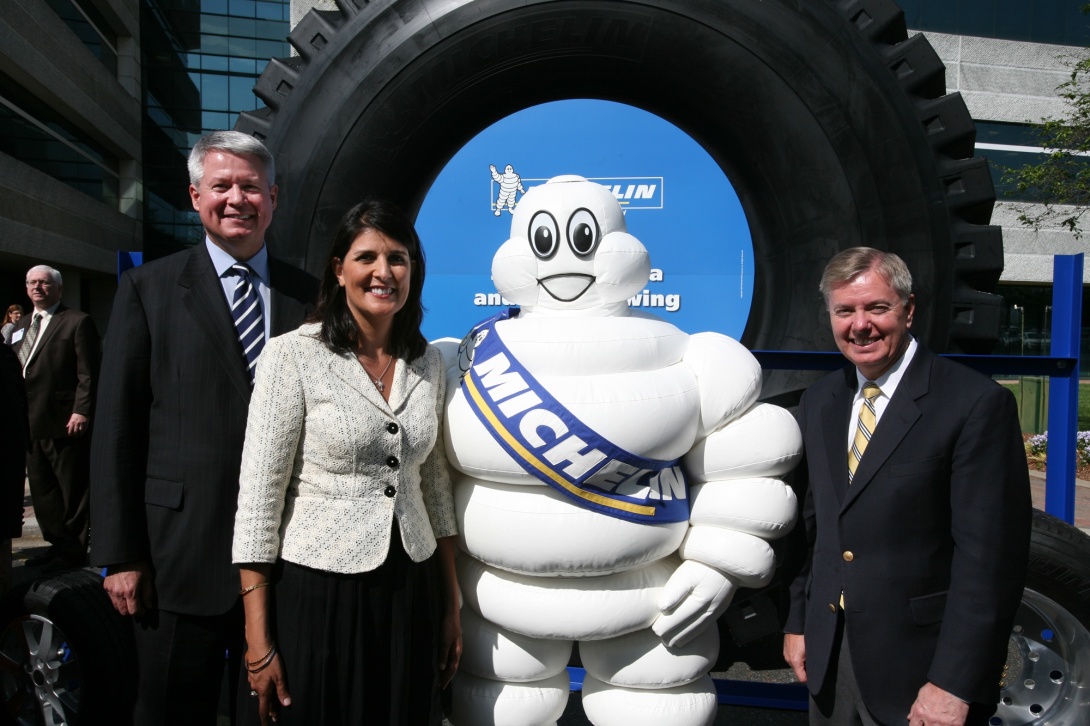We subsidized it

By Phil Mattera, Dirt Diggers Digest
We Built It. The Romney campaign and the wider conservative movement believe they have a winner in a slogan designed to refute President Obama's comment about the role of government assistance to business in favor of an idealized Ayn Rand-style entrepreneurship that needs no stinkin' public infrastructure.
They are so confident, in fact, that they asked a strangely inapt group of messengers to promote the theme at the Republican Convention: a slew of governors. Since Ronald Reagan, the right has ignored the incongruity of having public officials play a leading role in denouncing the public sector. Yet the GOP governors who took to the stage in Tampa to celebrate up-by-one's-bootstraps free enterprise raised this hypocrisy to new heights.
Despite their frequently expressed laissez-faire beliefs, they have each presided over deals in which huge sums of taxpayer money have been handed over to large corporations in the name of economic development. The Romney campaign, which has been making deceitful allegations about Obama Administration changes in welfare work requirements, chose to have its big convention theme delivered by some of the biggest proponents of corporate welfare.
Take South Carolina Gov. Nikki Haley. She used her convention speech to honor her immigrant parents and the clothing company they created, adding: "So, President Obama, with all due respect, don't tell me that my parents didn't build their business." She also gave praise to Boeing, saying that her state "was blessed to welcome a great American company that chose to stay in our country to continue to do business." She failed to mention that Boeing's decision to locate its second Dreamliner assembly line in Charleston was more than a little influenced by a state and local subsidy package estimated to be worth more than $900 million.
That deal was originally negotiated by her predecessor Mark Sanford but Haley enthusiastically carried it out and went to great lengths to defend Boeing against Machinists union charges that the move to South Carolina was prompted by anti-union animus. Haley has also made subsidy deals of her own, including the $9 million recently given to Michelin for a tire plant (promotional photo with Haley, Michelin North America Chairman Pete Selleck and Sen. Lindsey Graham). Haley subsequently told a tire industry conference: "We want to help you do more business in South Carolina and we want to make sure that you grow. That's our job."
Virginia Gov. Bob McDonnell -- who told the convention "Big government didn't build America: You built America!" -- agreed to give up to $14 million in subsidies to Northrop Grumman to relocate its headquarters to northern Virginia. The move was motivated by a need to be near the company's dominant customer, the Pentagon, so the subsidies were probably unnecessary and could be seen as a reward for the large contributions the company made to his election campaign.
Ohio Gov. John Kasich, another member of the we-built-it chorus, has given in to job blackmail demands by companies threatening to move their operations out of state unless they got big subsidy deals. Kasich's administration negotiated $100 million packages with both Diebold Inc. and American Greetings Corp.
Wisconsin Gov. Scott Walker, a rightwing hero for his campaign against public worker collective bargaining rights, used his convention speech to emphasis the importance of letting people "control their own destiny in the private sector." In July, Walker announced that the state had awarded $62 million in tax credits to Kohl's to get the retailer to expand its headquarters in the Milwaukee suburb of Menomonee Falls.
And then there's conservative bad-boy idol Chris Christie, who gave the keynote address at the convention. The New Jersey governor's administration has been handing out lavish tax credit deals to companies moving from one location in the state to another, including $250 million to Prudential Insurance, $100 million to Panasonic and $81 million to Goya Foods. Since taking office in 2010, Christie has given away more than $1.5 billion in subsidies to corporations.
The examples above focus on bigger deals involving larger companies, since those are the ones with the biggest giveaways of taxpayer funds. Yet many state subsidy programs also serve smaller firms. My colleagues and I at Good Jobs First have assembled data on more than 200,000 subsidy awards from state and local governments around the country in our Subsidy Tracker database. Most of the recipients are not in the Fortune 500.
I cannot resist mentioning that one of those small recipients is First State Manufacturing, a business run by Sher Valenzuela, who is running for Lt. Governor in Delaware on a tea party platform and who was given time at the Republican convention to tell her "I built it" story. In addition to the federal contracts and Small Business Administration loans revealed by Media Matters, information gathered for Subsidy Tracker shows that First State has received more than $29,000 in reimbursements for training costs through Delaware's Blue Collar Training Grant program -- a modest amount but another indication of business dependence on government.
Claims about the autonomy of the private sector are one of the Big Lies of modern conservatism. The real objective of the Right is along the lines of what Gov. Haley told that tire industry conference: to make sure government serves business through subsidies, deregulation, tax minimization and weakening of unions.
To the companies receiving these forms of assistance to expand their business, one could easily adopt the language of President Obama and say "you didn’t build that alone." The truth is that both liberals and conservatives believe that government should aid the private sector. The difference between the two is in what is expected in return. Liberals make an effort (albeit inadequate) to impose some accountability, whereas the Right believes that business should be able to take all it wants with no strings attached. The debate over whether to limit government should really be one on whether there will be limits on corporate power.
